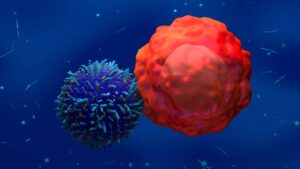Prescient has some very positive findings to share about its OmniCAR platform’s tumour-killing abilities

Pic: Luis Alvarez / DigitalVision via Getty Images
Prescient’s OmniCAR platform could overcome the limitations of CAR-T treatments for cancer and it’s attracting the attention of leading global therapy decision makers.
Clinical stage oncology company Prescient Therapeutics (ASX:PTX) will present pre-clinical data on its OmniCAR platform at a key international cell and gene conference.
OmniCAR was developed to overcome challenges and limitations of CAR-T treatments – a new type of intervention used in immunotherapy and cancer treatment.
Prescient Director of Scientific Affairs Dr Rebecca Lim said the latest results demonstrate important capabilities of OmniCAR to deliver next generation cell therapies that are controllable and able to target multiple cancer antigens.
These are key milestones for Prescient’s in-house OmniCAR programs as well as in the development of the overall platform and for potential partners and collaborators.
It is these crucial milestones which will be presented at the Cell & Gene Meeting on the Mesa in Carlsbad, California in the coming days. The conference brings together international senior executives and decision makers on therapies, including cell therapy.
The company’s most recent work, conducted in collaboration with the Peter MacCallum Cancer Centre in Melbourne, showed that OmniCAR-T cells begin antigen-directed killing of tumour cells in vitro as soon as they are armed.
“The team also showed that OmniCAR-T cells could be re-armed and continue to kill tumour cells without loss of cytotoxicity,” Lim said.
“Excitingly, we saw for the first time the real-time ‘switchability’ of the OmniCAR system where the tumour killing ability of the OmniCAR-T cells could be redirected towards a different antigen through the addition of a different binder.
“These early wins are extremely encouraging, and we look forward to the next phase of pre-clinical testing where the OmniCAR technology will be put through its paces using gold standard cancer models.”
OmniCAR aims to overcome major CAR-T therapy obstacle
A dose response relationship is the correlation between the amount of drug given and magnitude of response. In conventional pharmacology, dose responses are typically straightforward to establish, with typically higher doses leading to greater effects.
However, in cell therapies such as CAR-T therapy, where living cells that continue to grow and divide are administered to patients, effects are considerably less predictable and controllable.
OmniCAR aims to overcome this challenge by combining the potent cytotoxicity of cell therapy with the control and predictability of a conventional drug.
Prescient conducted treatment of glioblastoma multiforme (GBM) cells with OmniCAR-T cells armed with varying amounts of SpyTagged EGFRviii and Her2 binders to test whether different doses of binders resulted in commensurate levels of CAR-T activity.
In both cases, OmniCAR showed dose-dependent tumour killing activity, with the ability to control OmniCAR-T cell activity proportional with the amount of binder administered.
Furthermore, this version of OmniCAR, employing version 3 of the SpyTag/SpyCatcher (ST/SC) system, demonstrated especially high potency, with 60-fold less binder, which has implications for further improving patient safety and lowering cost of goods.
Re-arming capability of OmniCAR a game-changer in CAR-T cell treatment
Single infusions of CAR-T cells may be insufficient to drive meaningful patient outcomes in many cancers, especially solid tumours. Whilst some CAR-T studies have demonstrated clinical efficacy in stubborn cancers with up to seven separate infusions of CAR-T cells, the time, cost, logistics and patient requirements of this approach is prohibitive.
In contrast, achieving ongoing control of T cell activity through complete control of binder administration is viable, logistically undemanding, and inexpensive. Moreover, this method is identical to infusions of biological therapeutics used routinely in clinical practice today.
Prescient has demonstrated the re-arming capability of OmniCAR. OmniCAR-T cells pre-armed with Her2 binders demonstrated potent ability to kill cancer cells expressing Her2.
The cells were then washed and rested for seven days, resulting in unarmed OmniCAR cells. These same OmniCAR-T cells were then capable of being re-armed with Her2 binders, and once again demonstrated targeted killing.
Furthermore, the re-armed cells exhibited the same levels and kinetics of cytotoxicity of pre-armed OmniCAR-T cells, demonstrating that OmniCAR cells can be unarmed, re-armed and still kill.
Treatment hope for GBM brain cancer
Glioblastoma (GBM) is a fast-growing and aggressive brain tumor, characterised by antigen heterogeneity and rapid mutations that drive rapid progression of disease.
These characteristics present significant challenges for therapies, including CAR-T therapies, that rely on single antigen targeting. However, Prescient is seeking to overcome these limitations and provide more effective treatment with the development of OmniCAR to enable multi-antigen targeting.
Prescient has now demonstrated a unique feature of OmniCAR to redirect a single cell product from one cancer antigen to another in GBM cells.
In a novel experiment, OmniCAR was tested sequentially against a co-culture of GBM cells expressing antigens Her2 or EGFRviii. OmniCAR-T cells pre-armed with EGFRviii binders demonstrated rapid cytotoxicity against those GBM cells expressing EGFRviii.
Prescient still to discover true powers of OmniCAR
Prescient Managing Director and CEO Steven Yatomi-Clarke the company looks forward to presenting their data at Cell & Gene Meeting to prominent companies in the field.
“It is very pleasing to see a large body of work accomplished successfully so quickly and is a credit to the Prescient team and the incredible collaborators at Peter MacCallum Cancer Centre,” he said.
“Importantly, none of these tests have even been optimised, so we have yet to see the true limits of this technology.
“OmniCAR is proving to be a predictable and powerful system to work with and we look forward to sharing updates as our programs progress.”
Prescient’s drug therapy PTX-100 also shows promise
Meanwhile Prescient’s cancer-fighting drug therapy PTX-100 is also showing significant promise for the company, with early stage trials showing benefit to patients with hard to treat cancers.
PTX-100 works by blocking an important protein known as GGT-1 that is involved in cancer-causing pathways in cells.
The drug was well-tolerated, even at the highest dose, with its safety profile meaning it might benefit fragile patients unable to tolerate more toxic therapies, or as a combination agent with other treatments.
Shares in Prescient continue to rise on its promising results, up 11% at the time of writing to 25 cents.
The company will be hosting an ‘OmniCAR Explainer’ session next Tuesday 19th October at 11am (AEDT) where they will discuss the results in more detail. Click here to book in.
This article was developed in collaboration with Prescient Therapeutics, a Stockhead advertiser at the time of publishing.
This article does not constitute financial product advice. You should consider obtaining independent advice before making any financial decisions.
Related Topics

UNLOCK INSIGHTS
Discover the untold stories of emerging ASX stocks.
Daily news and expert analysis, it's free to subscribe.
By proceeding, you confirm you understand that we handle personal information in accordance with our Privacy Policy.








